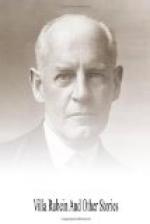“It’s my country up there. I was born amongst the mountains. I looked after the cows, and slept in hay-cocks, and cut the trees in winter. They used to call me a ‘black sheep,’ a ‘loafer’ in my village.”
“Why?”
“Ah! why? I worked as hard as any of them. But I wanted to get away. Do you think I could have stayed there all my life?”
Christian’s eyes grew eager.
“If people don’t understand what it is you want to do, they always call you a loafer!” muttered Harz.
“But you did what you meant to do in spite of them,” Christian said.
For herself it was so hard to finish or decide. When in the old days she told Greta stories, the latter, whose instinct was always for the definite, would say: “And what came at the end, Chris? Do finish it this morning!” but Christian never could. Her thoughts were deep, vague, dreamy, invaded by both sides of every question. Whatever she did, her needlework, her verse-making, her painting, all had its charm; but it was not always what it was intended for at the beginning. Nicholas Treffry had once said of her: “When Chris starts out to make a hat, it may turn out an altar-cloth, but you may bet it won’t be a hat.” It was her instinct to look for what things meant; and this took more than all her time. She knew herself better than most girls of nineteen, but it was her reason that had informed her, not her feelings. In her sheltered life, her heart had never been ruffled except by rare fits of passion—“tantrums” old Nicholas Treffry dubbed them—at what seemed to her mean or unjust.
“If I were a man,” she said, “and going to be great, I should have wanted to begin at the very bottom as you did.”
“Yes,” said Harz quickly, “one should be able to feel everything.”
She did not notice how simply he assumed that he was going to be great. He went on, a smile twisting his mouth unpleasantly beneath its dark moustache—“Not many people think like you! It’s a crime not to have been born a gentleman.”
“That’s a sneer,” said Christian; “I didn’t think you would have sneered!”
“It is true. What is the use of pretending that it isn’t?”
“It may be true, but it is finer not to say it!”
“By Heavens!” said Harz, striking one hand into the other, “if more truth were spoken there would not be so many shams.”
Christian looked down at him from her seat on the stile.
“You are right all the same, Fraulein Christian,” he added suddenly; “that’s a very little business. Work is what matters, and trying to see the beauty in the world.”
Christian’s face changed. She understood, well enough, this craving after beauty. Slipping down from the stile, she drew a slow deep breath.
“Yes!” she said. Neither spoke for some time, then Harz said shyly:
“If you and Fraulein Greta would ever like to come and see my studio, I should be so happy. I would try and clean it up for you!”




